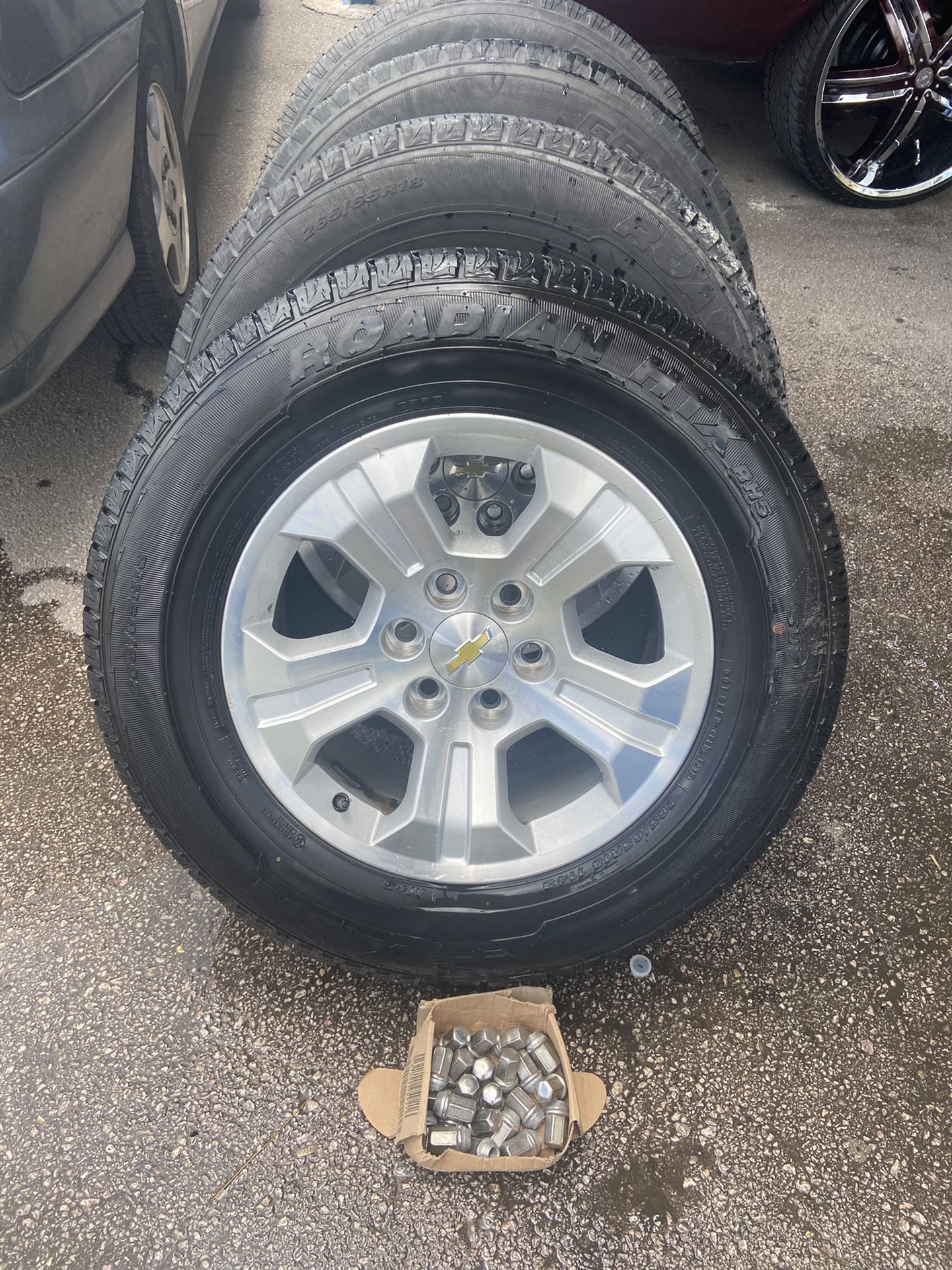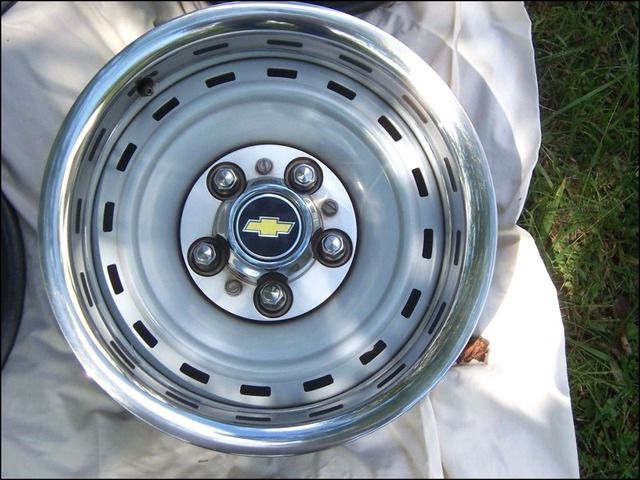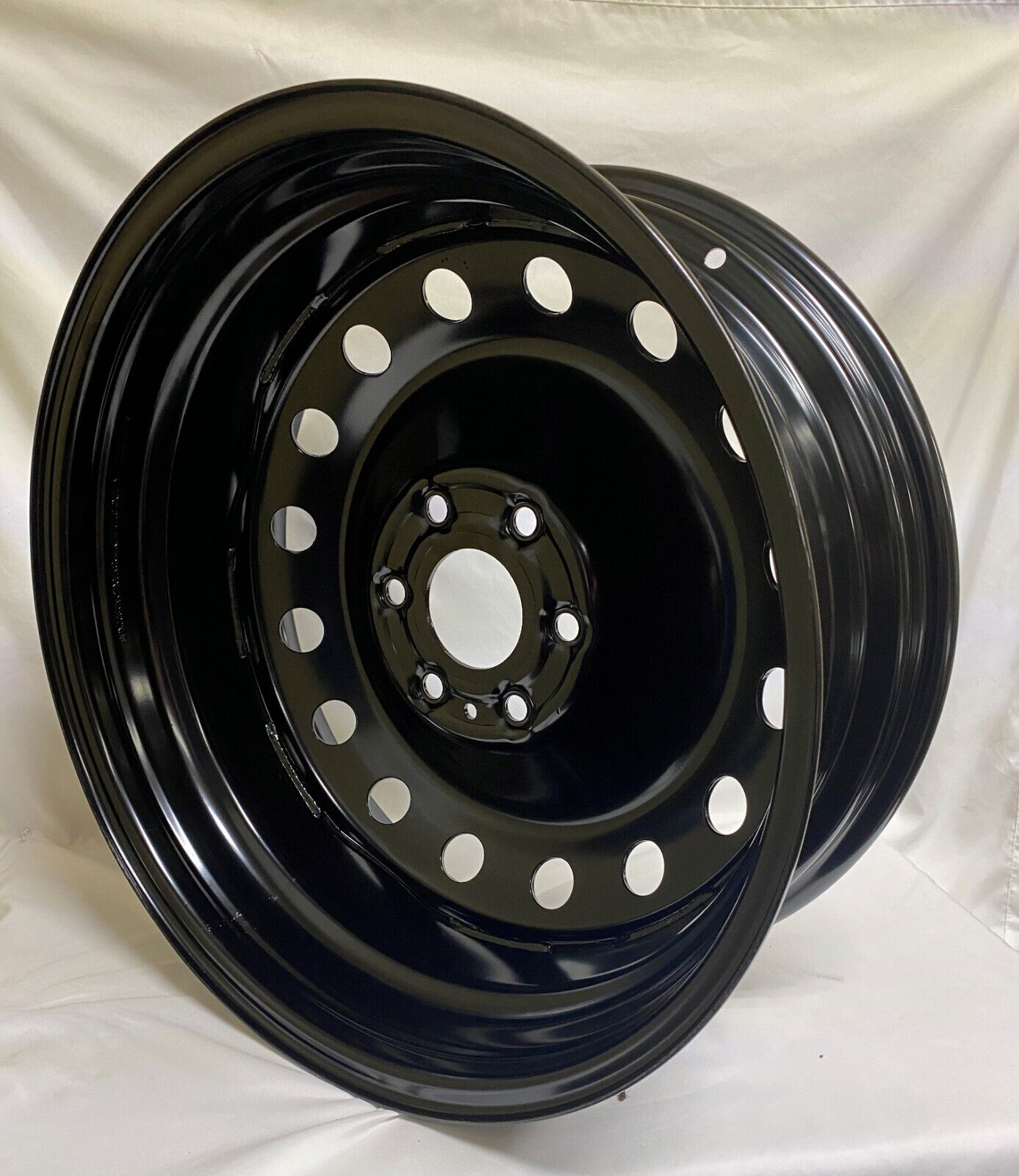18 Inch 6 Lug Chevy Wheels: The Ultimate Guide pickup.truckstrend.com
The wheels on your Chevrolet vehicle are more than just a means to connect tires to the axle; they are a critical component influencing everything from performance and handling to aesthetics and safety. Among the myriad of choices available, "18 Inch 6 Lug Chevy Wheels" stand out as a highly popular and versatile option for a wide range of Chevy trucks and SUVs. This specific configuration strikes an optimal balance, offering a commanding presence, enhanced driving dynamics, and a broad selection of compatible tires.
This comprehensive guide will delve into the world of 18-inch 6-lug Chevy wheels, exploring what makes them a preferred choice, the technical considerations for proper fitment, the variety of styles available, and essential tips for maintenance and longevity. Whether you’re upgrading your Silverado, customizing your Tahoe, or refreshing your Colorado, understanding these wheels is key to making an informed decision.
18 Inch 6 Lug Chevy Wheels: The Ultimate Guide
Understanding the Basics: What Do "18 Inch" and "6 Lug" Mean for Chevy?
Before diving into the specifics, let’s break down the core terminology:
- 18 Inch: This refers to the diameter of the wheel in inches. An 18-inch wheel is a common "plus-size" upgrade from smaller stock wheels (like 16 or 17 inches) or a standard size on many newer Chevy models. This diameter offers a sweet spot: large enough to enhance visual appeal and accommodate larger brake calipers, yet not so large that it severely compromises ride comfort or tire sidewall height for off-road applications.
- 6 Lug: This indicates the number of lug nuts required to secure the wheel to the vehicle’s hub. For most 6-lug Chevrolet trucks and large SUVs, this translates to a 6×5.5 inch (or 6×139.7mm) bolt pattern. This measurement is crucial as it describes the diameter of the circle formed by the centers of the six lug holes. Matching this bolt pattern precisely is non-negotiable for safety and proper wheel mounting.
Together, "18 Inch 6 Lug Chevy Wheels" specifically refers to wheels designed with an 18-inch diameter and a 6×5.5" (139.7mm) bolt pattern, compatible with a broad range of Chevrolet vehicles including:

- Chevrolet Silverado 1500 (most generations)
- Chevrolet Tahoe / Suburban (most generations)
- Chevrolet Avalanche
- Chevrolet Colorado (most generations)
- Chevrolet Express Vans (certain models)
- And various other GM trucks and SUVs (e.g., GMC Sierra, Yukon, Canyon).
Why Choose 18 Inch 6 Lug Wheels for Your Chevy?

The popularity of this specific wheel configuration is no accident. It offers a compelling blend of advantages:
- Aesthetics and Stance: 18-inch wheels typically fill the wheel wells more effectively than smaller diameters, giving your Chevy a more modern, aggressive, and substantial look. They provide a balanced aesthetic, showcasing both the wheel design and a respectable tire sidewall.
- Performance Versatility: This size strikes an excellent balance between on-road handling and off-road capability. The larger diameter allows for larger brake components, potentially improving stopping power. Simultaneously, there’s still enough tire sidewall to absorb road imperfections, offering a comfortable ride, and providing essential flex for off-road traction.
- Extensive Tire Availability: The 18-inch tire market is incredibly robust. You’ll find a vast selection of tires designed for various applications, including all-terrain, mud-terrain, highway, and performance tires, from virtually every major manufacturer. This flexibility ensures you can find the perfect tire to match your driving needs and conditions.
- Optimal Ride Quality: Compared to larger 20-inch or 22-inch wheels, 18-inch wheels often contribute to a smoother, more compliant ride, as the tire has more sidewall to absorb impacts. This is particularly beneficial for daily driving and light off-roading.
- Cost-Effectiveness: While not the cheapest option, 18-inch wheels and tires generally offer a better price-to-performance ratio than larger diameters, which tend to become significantly more expensive.
- Good for Towing/Hauling: For trucks and SUVs that frequently tow or haul, the balance of ride comfort, tire availability, and load capacity offered by 18-inch wheels is often ideal.
Compatibility and Fitment: Ensuring a Perfect Match
Choosing the right 18-inch 6-lug wheels goes beyond just diameter and bolt pattern. Precise fitment is paramount to avoid rubbing, ensure proper alignment, and maintain safety.
- Bolt Pattern Confirmation: Always re-confirm your vehicle’s exact bolt pattern. While most 6-lug Chevys use 6×5.5" (139.7mm), it’s vital to be certain. Consult your owner’s manual or a reputable wheel fitment guide.
- Offset and Backspacing: These are perhaps the most critical, yet often misunderstood, measurements:
- Offset: The distance from the wheel’s mounting surface to the wheel’s true centerline.
- Positive Offset: The mounting surface is closer to the outside of the wheel. This typically tucks the wheel further under the fender. Common for most modern trucks.
- Negative Offset: The mounting surface is closer to the inside of the wheel. This pushes the wheel further out from the fender, creating a "deeper dish" look. Common for aggressive off-road setups.
- Zero Offset: The mounting surface is exactly at the wheel’s centerline.
- Backspacing: The distance from the wheel’s mounting surface to the back edge of the wheel.
- Why they matter: Incorrect offset or backspacing can cause the tires to rub against suspension components, fender liners, or fenders, especially during turns or suspension compression. Your vehicle’s factory specifications provide a baseline, but aftermarket wheels often deviate to achieve a desired look or accommodate larger tires.
- Offset: The distance from the wheel’s mounting surface to the wheel’s true centerline.
- Center Bore: This is the hole in the center of the wheel that fits over the vehicle’s hub.
- Hub-Centric: When the wheel’s center bore perfectly matches the hub, it ensures the wheel is centered precisely by the hub itself, leading to a smoother ride and less stress on the lug studs.
- Lug-Centric: If the wheel’s center bore is larger than the hub, the wheel is centered only by the lug nuts. While functional, it can sometimes lead to minor vibrations. In such cases, hub-centric rings are highly recommended to bridge the gap and ensure proper centering.
- Vehicle Specifics: Consider your specific Chevy model, year, and trim. A Silverado 1500 from 2005 might have different ideal fitment parameters than a 2020 model, especially concerning brake caliper clearance.
- Suspension Modifications: If your Chevy has a lift or leveling kit, it will significantly impact the maximum tire size and wheel offset you can run without rubbing. Consult with the lift kit manufacturer’s recommendations.
Types and Styles of 18 Inch 6 Lug Chevy Wheels
The variety of 18-inch 6-lug wheels is immense, offering options for every taste and budget:
- Material:
- Alloy Wheels (Aluminum Alloy): The most common type for aftermarket and modern OEM wheels. They are lighter than steel, improve heat dissipation from brakes, and allow for intricate designs and various finishes.
- Steel Wheels: Heavier and typically less aesthetically pleasing, but very durable and often found on base model trucks or used as winter wheels. They are also generally more affordable.
- Construction:
- Cast Wheels: The most common and affordable. Molten metal is poured into a mold. They are strong but can be heavier and potentially more brittle than forged wheels.
- Flow-Formed (or Rotary Forged) Wheels: A hybrid process where a cast wheel is spun and heated to compress the aluminum, making it stronger and lighter than a traditional cast wheel, at a mid-range price point.
- Forged Wheels: Made by pressing a solid block of aluminum under extreme pressure. This creates a very dense, strong, and lightweight wheel. They are typically the most expensive but offer superior performance and durability.
- Finishes: The aesthetic options are nearly endless:
- Chrome: Classic, highly reflective, premium look.
- Machined: A raw aluminum look with clear coat, often with painted accents.
- Painted: Black (gloss, matte, satin), gunmetal, silver, bronze, or custom colors. Black wheels are particularly popular for a modern, aggressive look.
- Polished: Highly reflective like chrome but without the plating, requires more maintenance to prevent oxidation.
- Design: From multi-spoke, mesh, and directional designs to deep-dish and simulated beadlock styles, there’s a design to complement any Chevy’s character.
- OEM vs. Aftermarket:
- OEM (Original Equipment Manufacturer) Wheels: Designed specifically by Chevrolet for your vehicle, ensuring perfect fitment and often maintaining a factory look. Can be purchased new or used.
- Aftermarket Wheels: Offer a vast array of designs, finishes, and performance characteristics. They allow for greater customization and unique styling.
Installation and Maintenance Tips
Proper installation and ongoing maintenance are crucial for the longevity and performance of your 18-inch 6-lug Chevy wheels and tires.
- Professional Installation: Always have new wheels and tires installed by a qualified professional. They have the correct equipment for mounting, balancing (dynamic balancing is recommended), and torquing lug nuts to factory specifications.
- TPMS (Tire Pressure Monitoring System): Modern Chevys use TPMS. Ensure your new wheels are compatible with your existing sensors, or purchase new sensors if needed. Most reputable installers can transfer or program new sensors.
- Lug Nuts: Ensure you use the correct type of lug nuts for your new wheels. Aftermarket wheels often require different lug nuts (e.g., conical/acorn seat vs. spherical/ball seat) than OEM wheels to ensure proper seating and safety. Verify thread pitch as well (e.g., 14×1.5mm, 14×2.0mm).
- Re-Torque: After driving 50-100 miles on newly installed wheels, it’s critical to re-torque the lug nuts to the manufacturer’s specifications. Wheels can sometimes settle, causing lug nuts to loosen slightly.
- Regular Cleaning: Clean your wheels regularly, especially if you have an intricate design or a specific finish (like black or chrome). Use pH-neutral wheel cleaners and avoid harsh chemicals that can damage the finish. Brake dust is corrosive and should be removed promptly.
- Tire Rotation and Balancing: Follow your vehicle’s recommended tire rotation schedule (typically every 5,000-7,500 miles) and have your wheels re-balanced periodically to ensure even tire wear and a smooth ride.
- Inspection: Periodically inspect your wheels for any signs of damage, such as cracks, bends, curbing, or corrosion, which could compromise their integrity.
Potential Challenges and Solutions
While 18-inch 6-lug wheels offer many benefits, a few challenges can arise:
- Rubbing Issues: If wheels or tires are too wide, have an incorrect offset, or the vehicle isn’t lifted sufficiently, rubbing can occur.
- Solution: Carefully research wheel/tire fitment, use a wheel offset calculator, consider a leveling or lift kit, or be prepared for minor fender trimming (if necessary and acceptable).
- TPMS Incompatibility: New wheels might not directly accept existing TPMS sensors.
- Solution: Purchase new OEM or aftermarket TPMS sensors compatible with your vehicle and have them programmed by a professional.
- Incorrect Lug Nuts: Using the wrong lug nuts can damage the wheel or lead to unsafe conditions.
- Solution: Always use lug nuts that match the seat type (conical, spherical, flat) and thread pitch required by your new wheels and vehicle.
- "Tire Stretch" or "Bulge": Mounting tires that are too narrow or too wide for the wheel width can lead to uneven wear or safety concerns.
- Solution: Always consult tire manufacturer guidelines for recommended wheel width ranges for specific tire sizes.
- Budget Overruns: Quality wheels and tires, plus installation, can add up.
- Solution: Set a realistic budget, research prices, and factor in all associated costs (TPMS, mounting, balancing, alignment).
Estimated Price Guide: 18 Inch 6 Lug Chevy Wheels
Prices for 18-inch 6-lug Chevy wheels vary significantly based on material, construction, brand, finish, and whether they are OEM or aftermarket. The table below provides estimated price ranges per wheel, excluding tires, lug nuts, and installation.
| Wheel Type / Construction | Finish Options | Estimated Price Range (Per Wheel) | Key Features / Notes |
|---|---|---|---|
| OEM Steel Wheels | Black, Silver | $80 – $150 | Durable, heavy, often on base models or for winter use. |
| Aftermarket Cast Alloy | Painted (Black, Silver, Gunmetal), Machined | $150 – $350 | Most common aftermarket type, wide variety of styles, good balance of cost & quality. |
| OEM Aluminum Alloy Wheels | Machined, Painted, Polished, Chrome | $250 – $600+ | Factory wheels, perfect fitment, often take-offs available used. Price varies widely by specific model/design. |
| Flow-Formed / Rotary Forged | Painted (various), Machined, Bronze | $350 – $700+ | Lighter and stronger than cast, excellent performance for the price, growing popularity. |
| Premium Forged Wheels | Custom Painted, Polished, Brushed, Chrome | $800 – $2,000+ | Lightest, strongest, highest performance, fully customizable. Typically for high-end builds or racing. |
| Simulated Beadlock Wheels | Painted (Black, Bronze), Machined, with bolts | $200 – $500+ | Off-road styling, often cast alloy. (True beadlocks for off-road are significantly more expensive and often not street legal.) |
Note: These are estimates and prices can fluctuate based on market demand, sales, and specific retailer. Always confirm current pricing with a reputable dealer.
Frequently Asked Questions (FAQ)
Q1: Will 18-inch 6-lug wheels fit my specific Chevy model?
A1: Most Chevrolet Silverado 1500, Tahoe, Suburban, Colorado, Avalanche, and Express Van models that came with 6-lug wheels will accept 18-inch wheels. However, it’s crucial to verify your vehicle’s specific bolt pattern (almost always 6×5.5" or 6×139.7mm) and pay close attention to the wheel’s offset and backspacing to ensure proper clearance with your suspension and fenders.
Q2: What is the common bolt pattern for 6-lug Chevys?
A2: The standard bolt pattern for most 6-lug Chevrolet trucks and SUVs is 6×5.5 inches, which is equivalent to 6×139.7 millimeters.
Q3: Do I need new TPMS sensors when I get new 18-inch wheels?
A3: If your Chevy originally came with TPMS, you will likely need to transfer your existing sensors to the new wheels or purchase new, compatible TPMS sensors. Many aftermarket wheels are designed to accept OEM sensors, but it’s best to confirm with the wheel manufacturer or your installer. New sensors may need to be programmed to your vehicle.
Q4: What’s the difference between wheel offset and backspacing?
A4: Both measurements describe how much a wheel extends inward or outward. Offset is the distance from the wheel’s mounting surface to its true centerline. Backspacing is the distance from the mounting surface to the wheel’s rear lip. While different measurements, they are directly related, and understanding both helps determine how the wheel will sit in the fender well.
Q5: Can I use my old lug nuts with new aftermarket 18-inch wheels?
A5: Not always. Aftermarket wheels often require different lug nuts than OEM wheels. The "seat" type (where the lug nut contacts the wheel) must match (e.g., conical/acorn seat, spherical/ball seat, flat seat). Using the wrong type can damage the wheel or lead to unsafe conditions. Always verify the correct lug nut type and thread pitch for your new wheels.
Q6: How do I know if the wheels will rub?
A6: Rubbing typically occurs if the wheel’s offset pushes it too far out or in, or if the tire size is too large for your vehicle’s stock suspension. Consult online fitment guides, forums specific to your Chevy model, or a reputable wheel and tire shop. If you have a lift or leveling kit, ensure your chosen wheel/tire combination aligns with the kit manufacturer’s recommendations.
Q7: What’s the best tire size for 18-inch Chevy wheels?
A7: The "best" tire size depends on your specific Chevy model, whether it’s stock or lifted, and your intended use (e.g., daily driving, off-roading). Common tire sizes for 18-inch wheels on a Silverado 1500, for example, might range from 265/65R18 (near stock) up to 285/65R18 or 295/70R18 (with minor modifications or a lift). Always check your vehicle’s door jamb sticker for OEM tire sizes and consult a tire specialist for optimal choices.
Conclusion
18-inch 6-lug Chevy wheels represent an excellent choice for a vast majority of Chevrolet truck and SUV owners. They offer a compelling blend of aesthetic enhancement, performance versatility, and a wide array of tire options, making them a practical and popular upgrade. By understanding the critical aspects of fitment—including bolt pattern, offset, backspacing, and center bore—and adhering to proper installation and maintenance practices, you can ensure a safe, functional, and visually appealing enhancement to your vehicle.
Whether you’re aiming for a subtle factory-plus look or a more aggressive, custom stance, the world of 18-inch 6-lug wheels provides ample opportunities to personalize your Chevy. With careful research and informed decisions, these wheels will not only elevate your vehicle’s appearance but also contribute positively to its driving dynamics for years to come.




